Teens are more likely than their parents to say digital technology makes their lives easier; Parents of teens are less likely now than in 2004 to say the internet is a good thing for their children.
Teens and their parents1 often have similar technology profiles in the gadgets they use and the frequency with which they use them. But teens are notably more likely than their parents to say that the internet and related technology has made their own lives easier.
- 89% of online teens say the internet and other devices in their lives like cell phones, iPods, and digital cameras make their lives easier, while 71% of their parents say these technologies make their lives easier.
Furthermore, while a majority of parents with online teens still believe the internet is a beneficial factor in their children’s lives, there has been a decrease since 2004 in the number of parents who believe the internet is a good thing for their children.
At the same time, there has not been a corresponding increase in the percentage of parents who think the internet has been a bad thing for their children. Instead, more parents are neutral about whether their children have been positively affected by the internet, saying the internet has not had an effect on their child one way or another.
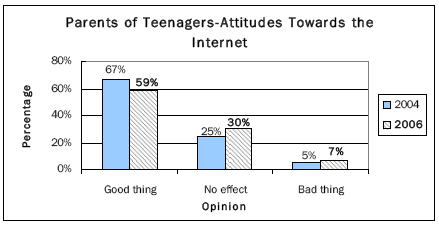
In most families, internet use is a subject of family rule-making and discussion. The content of web material, more than the time spent online, galvanizes the most parental intervention.
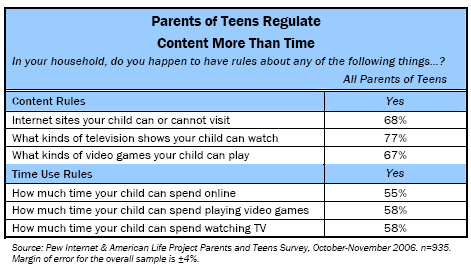
These findings are based on a survey of 935 parents and the youth in their families ages 12 to 17. It was fielded from October 23-November 19, 2006. The margin of error for the full sample is plus or minus 4 percentage points.
Other findings about teens and their parents
The role of digital technology in families continues to grow. Many of the results in the most recent survey are compared to another survey conducted by the Project in October 2004.
More parents and teens are online
Some 93% of youth are online and 94% of their parents are online. Overall, 87% of parents who have a child ages 12-17 use the internet, up from 80% in the 2004 survey.
There are several parts of the data in this survey that show that the tech profile of parents and teens often mirror each other. Parents who use the internet frequently have teenage children who use the internet frequently.
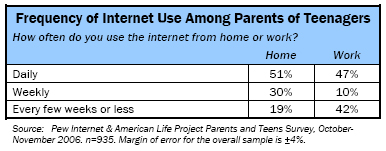
In general, online parents use the internet at the same level of frequency as they did in 2004. Slightly more than half (51%) of online parents report accessing the internet at least once a day from home, and slightly less than half of online parents (47%) report accessing the internet at least once a day from work. Overall, parents are more likely to report using the internet on a weekly basis from home than from work. Almost one-third of parents (32%) report that they never use the internet at work.
Parents and teens own a similar number of gadgets, but parents and children in the same household do not always own the same kinds of devices.
The majority of parents (64%) and teens (60%) in this survey own two or three gadgets; family members living in the same household also tend to own the same number of gadgets. However, in many cases, these parent-child pairs do not own the same devices.
Cell phones are the most widely-owned device among parents, followed by desktop computers. Among teens, desktop computers are the most widely-owned devices, followed by cell phones. Two-thirds of desktop-owning parents (64%) have children who also own desktop computers and 60% of parents who own cell phones have children who own them as well. This is not the case for the other gadgets which we asked about in this survey.
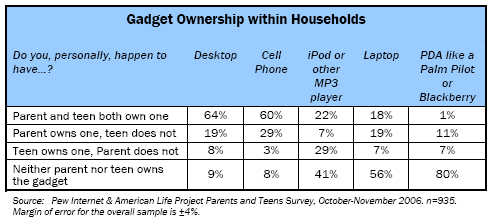
This difference is most pronounced with iPods and other MP3 playing devices, the one technological device that teens are more likely to own than their parents. Over half of teens (51%) report owning an iPod or MP3 playing device compared with 29% of parents, and yet 22% of parents who own iPods or similar devices live with children who also own a digital music-playing device.
This data suggest that parents who own more sophisticated and costly technology devices such as PDAs and laptops do not tend to give those same gadgets to their children. Rather than benefiting from a “hand-me-down” program, teens who own sophisticated gadgets have convinced their parents to buy these gadgets for them or have earned money to purchase these devices for themselves.
Parents with more household income and education are more likely to use the internet and have other gadgets.
As in 2004, internet use among parents with teenagers correlates directly with income. Of parents who live in households earning more than $75,000 a year, 98% report that they use the internet. At the lowest end of the household income spectrum (people who earn $30,000 or less), 60% of parents report that they go online.
Parents who have higher levels of education and larger household incomes are more likely to have a computer (either a laptop or a desktop) than parents who have less education and lower incomes, and they are also more likely to own smaller gadgets such as PDAs and iPods than parents who are not as well-educated and do not earn as much money. Parents of online teens are more likely to own gadgets than parents of teens who are not online (especially desktop computers, laptops, and iPods/MP3 players).
White parents are more likely to report using the internet than black parents. Fully 88% of white parents say they use the internet at least occasionally, compared with 72% of black parents. Hispanic parents who speak English fall in between white and black parents, with 84% saying that they use the internet at least occasionally. Of the parents that use the internet, there are no statistically significant differences in terms of frequency of use according to race.
Teens are more likely than their parents to see tech devices as helpful.
Teens are far more likely than their parents to view technological devices as playing helpful roles in their lives. Eighty-eight percent of all teens say that technology devices make their lives easier, compared with 69% of all parents who were asked about technology’s role in their own lives. While teens are more likely say that information and communication devices make their lives easier, teens who use the internet daily are much more likely to say so than teens who use the internet less than several times a week. With regard to parents, mothers are more likely than fathers to report that technology devices make their lives easier.
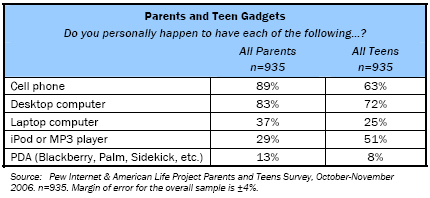
The type of gadgets parents own is unrelated to whether they report that technology has made their lives easier. Parents who own PDAs and laptops are just as likely to report that technology has made their lives easier as parents who own desktops, cell phones, and iPods or other MP3 players. However, the experiences that teens have with certain gadgets are associated with how teens feel about gadgets and technology in general. Teens who have desktops and cell phones are more likely to say that gadgets make life easier than teens who do not own those particular technology devices.2
Parents are now less likely to say that the internet has been a good thing for their children.
While well over half of all parents of online teens (59%) say that the internet has been a good thing for their children, that number has decreased a statistically significant amount from 67% in 2004. However, there has not been a corresponding change in the percent of parents who think the internet has been a bad thing for their children. Instead, more parents are becoming ambivalent about whether their children have been positively affected by the internet. In 2006, 30% of parents of online teens said that they did not think that the internet had an effect on their children one way or the other compared to 25% of parents in 2004. In general, parents who are highly educated are more likely to think that email and the internet have been good things for their children than parents with less education.
Ownership of high-end gadgets such as PDAs or laptops affects parents’ attitudes towards the internet. Parents who own devices such as PDAs and laptops are more likely to think the internet has been a good thing for their children than parents who do not own similar gadgets. Over two-thirds (68%) of parents who own PDAs or laptops say the internet has been a good thing for their children compared with 52% of parents who do not own those devices. On the other hand, parents who do not own PDAs or laptops are more likely to say that the internet has had no effect one way or the other on their children. Thirty-seven percent of parents who do not own PDAs or laptops are ambivalent about the internet’s impact on their children compared with 21% of their “techie” parent counterparts.
The majority of parents are trying to stay involved with teens’ online lives.
Despite the stereotype of the clueless parent, parents of today’s online teens are staying involved in their children’s online lives. Some 65% of parents report that after their child has been on the internet, they check to see what websites he or she viewed. In addition, almost three quarters of parents (74%) can correctly identify whether or not their online teen has ever created his/her own social networking site profile that others can see at sites such as MySpace or Facebook.
Parents are more concerned about media content than the amount of time their kids spend with media devices.
Parents of teenagers are more vigilant about regulating the media content consumed by their children than the amount of time their children spend in front of a screen. Over two-thirds of parents (68%) say they have rules about the kinds of internet sites their teenaged children can or cannot visit, as well as rules about what kinds of information their children can share with people they talk to on the internet. Three-fourths (77%) of parents say they have rules about what sort of television shows their children are allowed to watch, and 67% of all parents say they have rules about the kinds of video games their children can play.

Parents also make rules about the amount of time their teenaged children spend with media, but time with various media forms is not as widely controlled as the media content. There are no significant differences between the number of parents who have rules about the time their kids spend with television, the internet, and video games. Fifty-eight percent of all parents regulate how much time their children can spend watching television, 59% of all parents regulate how much time their children can spend playing video games, and 55% of all parents have rules about how much time their children can spend using the internet. However, a significantly greater percentage of online parents create rules about the amount of time that their children can spend on the internet than create rules about how much time their children can spend watching television – 69% of parents of online teens report regulating how much time their children spend on the web, while only 57% of those same parents have rules for how long their children are allowed to watch television.
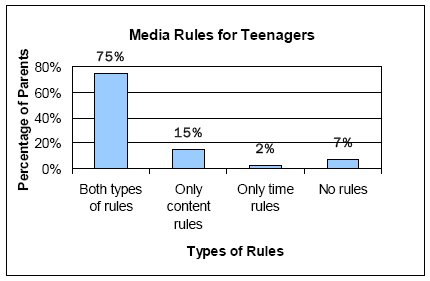
The majority of parents have media rules for both content and time. However, parents that only have one type of rule are more likely to make rules about media content rather than the time spent with the media device. If the parent does not institute both types of rules, he or she is more likely to have no media rules at all than to create rules around how much time their teen can spend using television, video games, or the internet.


